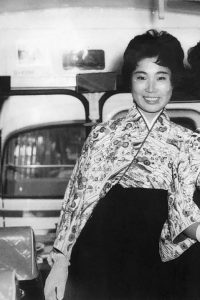My Life—Interview with Keiko Ogura (1937–), interpreter and A-bomb survivor, Part 5: Encounters
May 3, 2023
English connection to tour-guide work
When I was a second-year student at Hiroshima Jogakuin University, I had a fateful encounter. An acquaintance introduced me, a young A-bomb survivor who could speak English, to Robert Jungk, a Jewish journalist from Germany.
Mr. Jungk was already a world-renowned author for his work that included a book delving into the history of atomic-bomb development. During the period 1957–1980, he visited Hiroshima five times and interviewed A-bomb survivors.
He spoke with me behind the first Hiroshima Municipal Baseball Stadium, which had been newly built in the city’s centrally located Naka Ward. He asked me why such an extravagant baseball stadium was needed when citizens in Hiroshima still were unable to obtain sufficient food or housing in the aftermath of the atomic bombing. Mr. Jungk took a slightly critical view of the stadium, but he apparently wanted to listen to the opinions of a younger person. I said, as far as I can recall, “Even though our lives are hard, we can get an emotional boost from the sheer enjoyment. Hiroshima needs hope.”
In 1960, I graduated from university and was asked by one of my father’s acquaintances to start work at a bus company. In those days, Hiroshima Bus, Co. had headquarters in the area of Osuga-cho (in the city’s present-day Minami Ward), where my father had reopened his confectionery business. The bus company was about to launch a new project that involved the guiding of tourists around the city in English after the purchase of a luxurious sightseeing bus specifically for people from overseas.
I would visit and walk all around spots in Hiroshima and on the island of Miyajima for the purpose of writing notes for the interpreter-guides and translated those notes into English. However, the company had difficulty hiring guides, who were indispensable to the work. Ultimately, I ended up working as a guide. My father was not happy about my doing any sort of work. He fiercely opposed my work as a guide in particular, because I had to appear in front of people. But the company talked him into agreeing to the plan by promising him that I would work only as an ‘instructor’ until formal guides were hired.
My uniform, at first a kind of Japanese kimono with a green hakama (skirt-like trousers), became a crimson suit. Recently I found that I had made an appearance in a documentary filmed by Mr. Jungk in Hiroshima and broadcast in Germany, while on the job as a tour guide. I was apparently filmed without my knowledge.
One day, as I was eating at a restaurant in the New Hiroshima Hotel (present-day International Conference Center Hiroshima) with an overseas couple as clients, I saw Mr. Jungk in the distance. That reunion between us was the first time in three years we had seen each other since his interview of me at the baseball stadium. The man next to Mr. Jungk at that time was Kaoru Ogura, who turned out to be my future husband. Come to think of it, all of the people I met and my experiences around that time have greatly impacted my life. It’s strange, really.
(Originally published on May 3, 2023)








